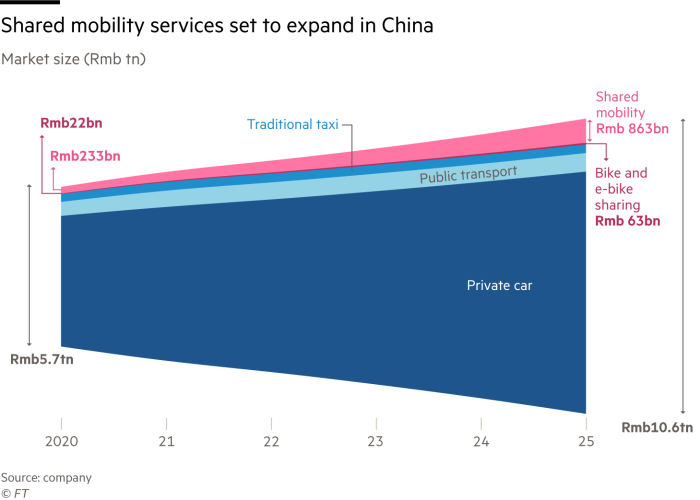Didi raises at minimum $4bn for New York inventory sector listing
6 min readChina’s ride-hailing app Didi Chuxing will make its debut on the New York Stock Trade after defeating Uber and getting dominant on the streets of the country’s key metropolitan areas, but with worries more than development and regulation on the horizon.
Beneath the title of its holding organization Xiaoju Kuaizhi, Didi raised at minimum $4bn in 1 of the greatest foreign original general public offerings since the 2014 Alibaba listing, right after pricing shares at the best end of its promoted assortment. Didi bought shares at $14 a piece, according to persons briefed on the offer, providing it a market capitalisation of at minimum $67bn. The company declined to remark.
Didi’s market worth would be a little bit above the $65bn valuation at which personal traders purchased into the enterprise in a 2018 fundraising, maybe reflecting how trader fascination in ride-hailing has waned in the wake of a disappointing 2019 IPO for US rival Uber.
Unlike when Uber arrived to the current market, Didi can boast profitability in its main rides small business considering that 2019, on an altered basis on earnings right before desire, tax, depreciation and amortisation. That main business helps make up 94 for each cent of Didi’s revenues of Rmb142bn ($22bn) in 2020.
This is a far bigger share of revenues than at Uber or Seize, which rely on speedy-escalating but lossmaking foodstuff deliveries for 35 for each cent and 49 for each cent of revenues respectively. In China, Didi is shut out from the shipping sector by huge rivals Meituan and Ele.me.
But even though Didi’s main organization is worthwhile, its margin on each trip that it books is much lessen than that of worldwide rivals, at about 3 for each cent, in comparison to 20 per cent for Uber.

Coronavirus lockdowns saw Didi’s bookings tumble by a third in the 1st quarter of very last year but China’s stringent and mainly profitable containment of the virus meant its rides business enterprise grew calendar year-on-12 months in the second 50 percent of 2020 and only fell 4.8 per cent for the calendar year.
In the initial quarter of 2021, Didi attained an in general optimistic net profits for the first time, mainly due to the deconsolidation of its team getting company, Chengxin Technological innovation, that brought in Rmb9.1bn ($1.4bn).
But analysts questioned irrespective of whether Didi may perhaps be achieving saturation in China’s premier towns, these kinds of as Beijing and Shanghai, which account for 50 percent of its bookings, and regardless of whether it can spin up new ventures to strengthen its development.
“The major question for Didi is whether its main China mobility can generate sufficient fiscal dry powder to fund its rising new company, these as autonomous driving,” Bernstein analysts wrote in a new be aware.
The head of funds marketplaces at just one US financial institution in Hong Kong reported that an original valuation IPO focus on of $100bn was “never a affordable starting up point” mainly because of the constraints of Didi’s current market. “Their huge problem is they will not very easily broaden outside experience-hailing like Uber did. The equivalent of Uber Eats and logistics are already crowded with deep-pocketed incumbents in China,” the particular person said.
Abroad, Didi has expanded to big establishing economies, this sort of as Brazil, but its non-China small business only accounts for beneath 2 for each cent of revenues.

Its dominance in China, nonetheless, is unquestioned. Considering that obtaining out Uber in 2016, Didi has developed to account for 90 for each cent of all on the internet automobile bookings in 2020, about two-thirds of which occur from the top 30 towns.
It does have some competitors in lesser towns and cities, with a lot more than 200 rivals running throughout the country. T3, a rival backed by Alibaba, Tencent and 3 Chinese carmakers, has been effective in creating current market share in Nanjing and Chongqing due to the fact of its small selling prices and self-owned fleet.
“Right now the revenue is large, but as levels of competition heats up in more compact cities they will have to bring down selling prices,” stated Cherry Leung, a Bernstein analyst.
But Didi’s backers argued that its profitability is scalable because its rivals are unlikely to engage in a a few-way selling price war fought between Didi, domestic rival Kuaidi Dache and Uber, from which Cheng Wei, Didi’s chair, emerged victorious in 2016.

Cheng and Jean Liu, a previous Goldman Sachs banker who turned Didi’s president in 2015, have so considerably averted acquiring to shell out even further costly subsidies to fend off rivals.
“It’s a pretty basic dilemma: if you want to do the same as Didi, are you inclined to burn up $20bn on attracting buyers?” said Kevin Wang, a founding partner of Ameba Capital and an early trader in Kuaidi Dache, which merged with Didi in 2015.
Soon after conceding defeat to Didi, Uber has retained a sizeable stake, now about 12.8 for every cent. Other key buyers include SoftBank’s Vision Fund, with 21.5 for each cent and Tencent, with 6.8 for every cent.
Far more urgent than competitors is the dilemma of irrespective of whether Didi can navigate tightening regulatory scrutiny in the course of Beijing’s sweeping crackdown on know-how groups considered to have grown as well highly effective, far too rapidly.
The firm has occur underneath fire for a array of concerns from failing to assure the safety of travellers to issues of unfair competitiveness and minimal shell out for motorists.
Earlier this thirty day period, a economic publication under the official Xinhua information company stated that antitrust investigations have been a “hanging sword” around the IPO, citing considerations around value correcting and an investigation into Didi’s deal to acquire above Uber’s China enterprise, number of information of which have at any time been launched.
In Could, Didi executives, together with more than 30 other journey-hailing firms, were summoned by the Ministry of Transportation above issues about drivers’ pay, following problems that Didi was using a 30 per cent slice of some fares.
The corporation has explained that the breakdown only utilized to underneath 3 per cent of situations and vowed to do improved to ensure fair fork out for drivers.
Even so, the business has been sent a crystal clear warning from authorities: “If Didi does not rectify its behaviour quickly, there could be even further escalation of regulatory actions,” claimed Angela Zhang, a scholar of Chinese antitrust law at the University of Hong Kong.
In the upcoming, Didi nonetheless sees assure in autonomous driving, in the hope of cutting out the require to shell out drivers, which accounts for 50 for every cent of the company’s costs.
But it has taken a additional careful tactic than rivals such as Baidu and AutoX, an Alibaba-backed get started-up, which have started eradicating safety motorists from cars. It secured a licence to have travellers in self-driving cars in Shanghai last 12 months, but has stated very little about its trials.
Zhang Xiang, a China-based mostly independent automotive analyst, said that Didi’s autonomous driving financial commitment is a way to distinguish alone from Uber right after the US business deserted self-driving in late 2020 and to potentially secure a substantial valuation for its autonomous enterprise.
“It helps make zero perception to start as a pure autonomous robotaxi services,” reported 1 of Didi’s early investors. “It will have to be hybrid developed on Didi’s mobility company, which has experienced a lot of several years to establish a back again-end tech platform.”
Further reporting by Tabby Kinder in Hong Kong and Emma Zhou in Beijing
Weekly e-newsletter

Your important information to the billions becoming built and shed in the entire world of Asia Tech. A curated menu of distinctive information, crisp examination, intelligent knowledge and the newest tech excitement from the FT and Nikkei





